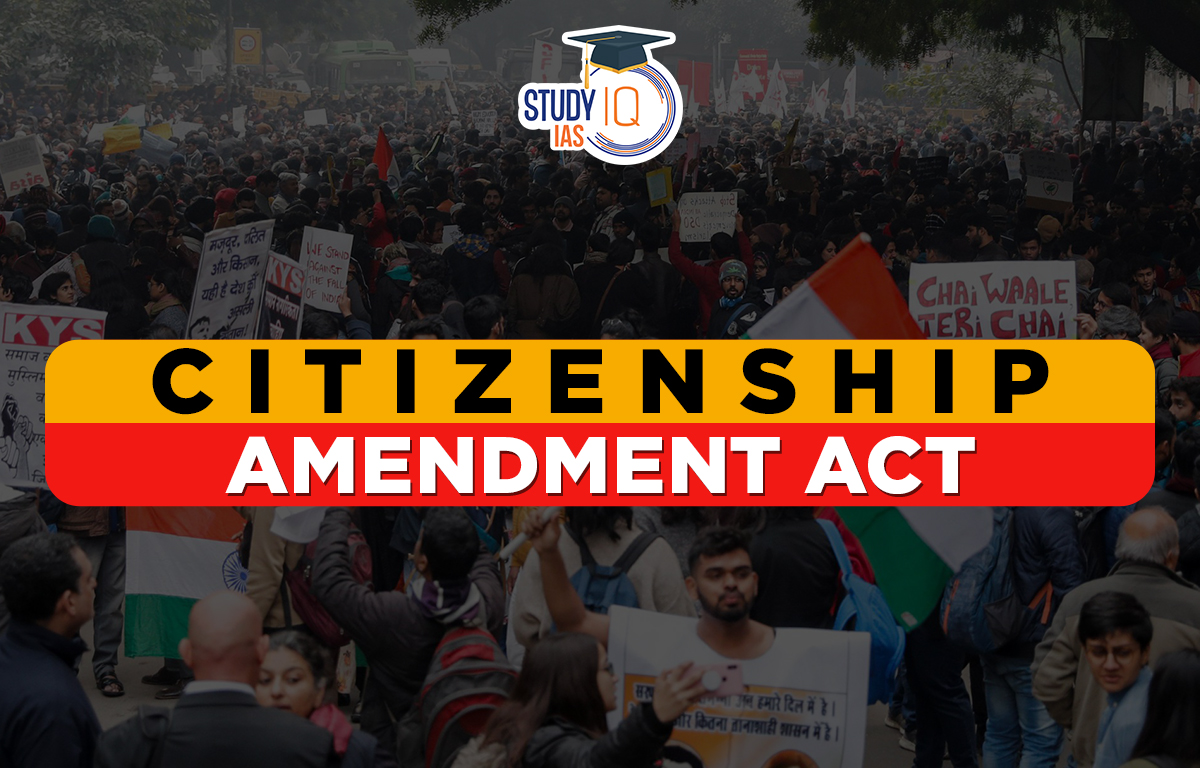Table of Contents
The Citizenship Act of 1955, enacted by Parliament under Article 11, outlines the methods for acquiring and terminating citizenship in India.
Citizenship Amendment Act 2019
India’s long-debated Citizenship Amendment Act (CAA) was now operational, permitting non-Muslim migrants from neighboring nations refuge due to religious persecution before December 31, 2014. The BJP administration’s move, just preceding the 2024 Lok Sabha elections, has reignited fervent debates. Applicants can conveniently apply online sans extensive documentation.
Despite government assurances, critics, including West Bengal’s Mamata Banerjee, warn about possible misuse and religious bias in the CAA. Its quick passage raises doubts, with opposition leaders suggesting political motives. As India faces these changes, concerns remain about social unity and religious freedoms in a tense political climate.
| Date | Details |
| 9 December 2019 | CAA Bill Passed in Lok Sabha |
| 11 December 2019 | CAA Bill Passed in Rajya Sabha |
| 11 March 2024 | Citizenship Amendment Act Notification Released for Implementation |
What is CAA India?
CAA Full Form stands for Citizenship Amendment Act, a law passed by the Indian Parliament in December 2019. The Constitution of India deals with Citizenship under Part II (Articles 5 to 11); however, the constitution does not contain any elaborate provision related to Citizenship as it identifies only those individuals who became citizens of India during the commencement of the constitution.
It does not deal with the issues of acquiring and loss of citizenship in India. Hence Article 11 of the constitution empowers the parliament to enact laws concerning Citizenship in India. The CAA aims to expedite Indian citizenship for persecuted religious minorities from Afghanistan, Bangladesh, and Pakistan.
Citizenship Amendment Act 2019
The Citizenship (Amendment) Act (CAA) of 2019 aims to give citizenship to illegal migrants from Afghanistan, Bangladesh, and Pakistan who are Hindus, Sikhs, Buddhists, Jains, Parsis, and Christians. Recently, the Ministry of Home Affairs announced the CAA Rules, 2024, to implement this Act. However, the CAA has faced criticism for allegedly violating the right to equality mentioned in Article 14 of the Constitution.
Features of the CAA 2019
Eligibility:
- The CAA modifies the Citizenship Act of 1955, making it possible for certain illegal migrants from specific religious communities to become Indian citizens.
- An illegal migrant is someone who enters India without valid documents or stays longer than allowed, and they can face legal actions.
- Migrants from these communities who entered India on or before December 31, 2014, will not be treated as illegal.
Requirements:
- The residency requirement to apply for citizenship has been reduced from 11 years to 6 years for these communities.
- They are also exempt from being treated as illegal immigrants under certain laws.
Exceptions:
- The CAA does not apply to certain tribal areas in Assam, Meghalaya, Mizoram, and Tripura, or to states that have special regulations.
Impact of Citizenship:
- Once granted citizenship, individuals are considered Indian citizens from the date they entered the country, and any legal cases against them regarding their immigration status will be dropped.
Supporting the CAA
- Many minorities from these countries faced persecution due to their religion, prompting them to seek refuge in India.
- The CAA aims to help these persecuted religious minorities find safety and rights in India.
- It reflects India’s historical role as a safe haven for such groups and addresses humanitarian needs.
- Supporters argue that the law makes a reasonable distinction based on religion to protect those facing persecution while still focusing on national interests.
Citizenship Amendment Act (CAA) Controversy
Background
India’s citizenship rights did not exist until India gained its independence. Such rights were not guaranteed under British rule; the British Citizenship and Aliens Rights Act of 1914, which was abolished in 1948, was in effect throughout the pre-independence period. According to the British Nationality Act, Indians were originally classified as British subjects without citizenship.
A large-scale movement of the population took place across a new border separating India and Pakistan after the partition in 1947, due to which the constituent assembly limited the scope of the provision of citizenship in the constitution and empowered the Parliament for determining citizenship rights. As a result, Parliament enacted the Citizenship Amendment Act of 1955.
Critics of the Citizenship Amendment Act (CAA) argue that it is unfair and goes against India’s secular values. They believe that citizenship should not depend on a person’s religion, as this violates the Constitution’s principle of equality, which ensures everyone is treated the same under the law. Here are some main points of criticism:
- Exclusionary Nature: The law includes only certain religious minorities from specific countries, leaving out others like Ahmadiyyas and Hazaras from Pakistan and Afghanistan, Rohingyas from Myanmar, and Tamils from Sri Lanka. This creates unfair distinctions.
- Violation of Article 14: By providing citizenship based on religion, the CAA is seen as violating the fundamental right to equality, making it anti-secular.
- Entry Date Criteria: The rule that only migrants who entered India before December 31, 2014, can apply for citizenship seems arbitrary and lacks clear reasoning.
- Government Discretion: The Act gives the central government broad powers to cancel registrations of Overseas Citizens of India (OCI), which critics see as excessive.
CAA Rules 2024
After a delay of more than four years, the Ministry of Home Affairs has announced the Citizenship Amendment Rules, 2024, to implement the CAA. Key points include:
- Application Process: Eligible refugees must apply with documents confirming their identity, character references from Indian citizens, and proof of knowledge of an Indian language.
- Electronic Applications: Applications must be submitted online to a district-level committee for verification. Not attending in person could lead to rejection.
- Supporting Documents: Applicants need to provide various documents, such as passports, birth certificates, or proof of ancestry.
- Entry Date Verification: Applicants must prove they entered India before December 31, 2014, using specific documents.
- Digital Citizenship Certificate: Those approved will receive a digital certificate confirming their citizenship.
Impacts of the CAA 2019
The CAA has sparked various discussions and concerns in India:
- Social Polarization: The law has caused divisions based on religion, leading to fears of increased communal tensions.
- Global Criticism: Many international organizations have condemned the law for violating human rights standards, and neighboring countries like Bangladesh and Pakistan have reacted diplomatically.
- Protests: The CAA led to widespread protests across India, some of which turned violent, particularly in Delhi.
- Concerns About the Assam Accord: There are fears that the CAA might conflict with the Assam Accord of 1985, which aimed to identify and deport illegal immigrants.
- Risk of Discrimination: Many poor citizens may not have the required documents to prove their citizenship, putting them at risk of losing their status.
- Concerns for Native Citizens: Granting citizenship to illegal migrants raises worries among local citizens about changes in demographics and their effects on jobs and land ownership.
- Federalism Issues: Several states have opposed the CAA, claiming it violates the Constitution. States like West Bengal and Tamil Nadu have stated they will not implement the law.
The Supreme Court is currently reviewing legal challenges against the CAA, focusing on concerns about religious discrimination and its alignment with Article 14 of the Constitution.
How Many Times Citizenship Act Amended?
| Citizenship Act Amendments | Year of Amendment | Significant Changes |
|---|---|---|
| Citizenship Act of 1955 | – | Original enactment setting guidelines for acquiring and determining Indian citizenship. |
| 1st Amendment | 1986 | Introduced provisions for acquiring citizenship by birth, descent, registration, and naturalization. |
| 2nd Amendment | 1992 | Focused on the acquisition of overseas citizenship. |
| 3rd Amendment | 2003 | Added provisions regarding the registration of Overseas Citizens of India (OCI). |
| 4th Amendment | 2005 | Included provisions related to dual citizenship for Persons of Indian Origin (PIO). |
| 5th Amendment | 2015 | Introduced the concept of overseas citizenship for Indian diaspora. |
| 6th Amendment (CAA) | 2019 | Granted citizenship to illegal migrants from specified communities in neighboring countries. |
THE CITIZENSHIP (AMENDMENT) BILL, 2019 ( Official PDF)
Citizenship Amendment Act 1955
The act of 1955 talks about the acquisition and determination of Indian Citizenship, it also talks about overseas citizenship and the termination of Indian citizenship.
| Acquisition of Indian citizenship | Loss of Indian Citizenship |
|
|
Five amendments to the Citizenship Act of 1955 have been made since then in 1986, 2003, 2005, 2015, and 2019. By way of these modifications, Parliament has condensed the more general and universal foundations of citizenship based on the fact of birth through these amendments.
Citizenship Amendment Act 1986
The original Citizenship Act, which gave citizenship to everyone born in India on the basis of jus soli, and the 1986 revision to Section 3 were both more expansive than the constitutional provision. People born in India on or after January 26, 1950, but before July 1, 1987, had to be citizens of India as a result of the amendment.
A person is only eligible for citizenship if either of their parents was an Indian citizen at the time of their birth and they were born between July 1, 1987, and December 4, 2003.
Citizenship Amendment Act 2003
The standards were revised to be more stringent in order to prevent infiltration from Bangladesh under this amendment act of 2003. In addition to their own birth, children born on or after December 4, 2004, are now required to have either both Indian citizens or one Indian citizen and one who is not an illegal immigrant.
India is close to adopting the limited jus sanguinis (blood relationship) basis thanks to these restrained amendments. According to this, a person who entered India illegally and stayed there for seven years cannot become a citizen of India by naturalisation or registration.
Citizenship Amendment Act 2005
The dual citizenship system was included. Except for those who are citizens of Pakistan and Bangladesh, this applies to all nationals.
Citizenship Amendment Act 2015
Citizenship through Registration and Naturalisation: For individuals working for the Indian government and residing in the nation for 12 months, the government may ease the requirements for citizenship for up to 30 days. The amalgamation of the Persons of Indian Origin and Overseas Citizens of India programs.
Renunciation and Cancellation of Foreign Citizenship: There are provisions to revoke the Overseas Citizenship of India card received by a spouse of an Indian citizen or an Overseas Citizen of India if the marriage is declared null and void or the spouse marries someone else.
Conclusion
In conclusion, the Citizenship Amendment Act (CAA) has been a contentious issue in India, marked by debates over its potential impact on religious equality and secularism. The exclusion of Muslims from the list of eligible communities, concerns about its link to the National Register of Citizens (NRC), and widespread protests have fueled the controversy. As legal challenges persist, the CAA remains a focal point for discussions on the foundational principles of India’s democracy and its commitment to inclusivity.


 Mechanisms to Combat Judicial Corruption...
Mechanisms to Combat Judicial Corruption...
 Registrar General and Census Commissione...
Registrar General and Census Commissione...
 Ambedkar Jayanti 2025: Biography, Legacy...
Ambedkar Jayanti 2025: Biography, Legacy...





















